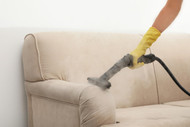Can Steam Cleaners Kill the COVID-19 Virus?
Posted by Discover on Jan 05, 2021
With disinfecting wipes destined to be a rare grocery store find for the remainder of the year, people might start eyeing steam cleaners as a new way to rid their home of SARS-CoV-2. But is a consumer steam cleaner all that effective against the coronavirus?
Cindy Prins, an epidemiologist at the University of Florida, can see why people might be asking this. People often hesitate to use bleach or other harsh cleaners around their home, and some of her own friends checked in with her about their own concerns with their new cleaning regimens. The kind of steam-based sterilization you’d want to pull off at home, however, likely doesn’t come with the consistency and reliability you need to ensure you’ve destroyed all the coronavirus in its path.
The Real Deal Steam Treatment
In hospital and medical settings, steam sterilization is a convenient tool for ridding materials of pathogens. Machines called autoclaves direct both steam and intense pressure onto whatever medical equipment staff fills them with, like glassware or petri dishes. The hot, high-pressure conditions rupture the protective exteriors of viruses and microbes, effectively bursting them, Prins says.
Right now, researchers don’t know if at-home steamers can mimic autoclaves and kill off SARS-CoV-2. “As far as I know, the experiment hasn’t been done or published,” Prins says. Additionally, what makes these hospital sterilization devices effective is that they operate within strict and specific parameters. High steam temperatures, applied for a given amount of time and pressure, make sure the contents come out sterile. Even if household steamers had the capacity to reach high temperatures for extended periods of time, it’s not clear how someone would need to use the appliance to make sure all the virus was killed off, say, a piece of floor paneling. How long would someone have to hold the hot steam in place?
Even if you had an autoclave on your kitchen counter, using it to deactivate coronavirus would be excessive. The hospital-grade sterilization machines can tackle even the toughest bacteria — like varieties that can successfully go dormant for periods of time by becoming relatively resistant to heat, chemicals or even UV light. But SARS-CoV-2 isn’t like these bacteria. “A lot of viruses are not difficult to inactivate," Prins says. "SARS-CoV-2 isn’t hard to inactivate.” The virus’s thin membrane exterior is easily busted apart by soap and disinfectants registered by the EPA for use against the pathogen.
In House Solutions
At-home steam cleaners could be useful for a kind of preliminary cleaning effort, Prins says. The devices can lift dirt or stains from a surface, which means that when you follow up with a disinfectant, you target any virus that would have otherwise lingered out of reach beneath the grime. Otherwise, soap and water (and a vigorous scrub) should be good enough to clean your hands of SARS-CoV-2, and those EPA-approved disinfectants will do the trick when it comes to high-touch surfaces, Prins says.
While you can use your hands to dislodge any dirt or virus from your skin and wash it away with water, that isn't always an ideal option with household items. “It’s harder in your home to hose down the counter,” Prins says. Disinfecting products don’t require the rinse step, so just make sure to follow package instructions and let the moisture linger on the target surface for the specified amount of time. And if you’re still wary of the chemicals transferring to your hands afterwards, wipe the surface off with a damp cloth after the disinfectant has had time to work, Prins says. You’ll remove the remaining residue.
Source - https://www.discovermagazine.com/health/can-steam-cleaners-kill-the-covid-19-virus

